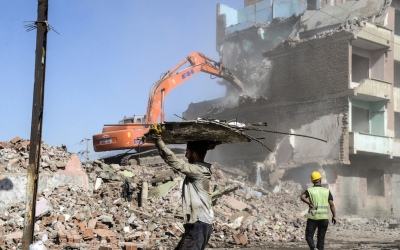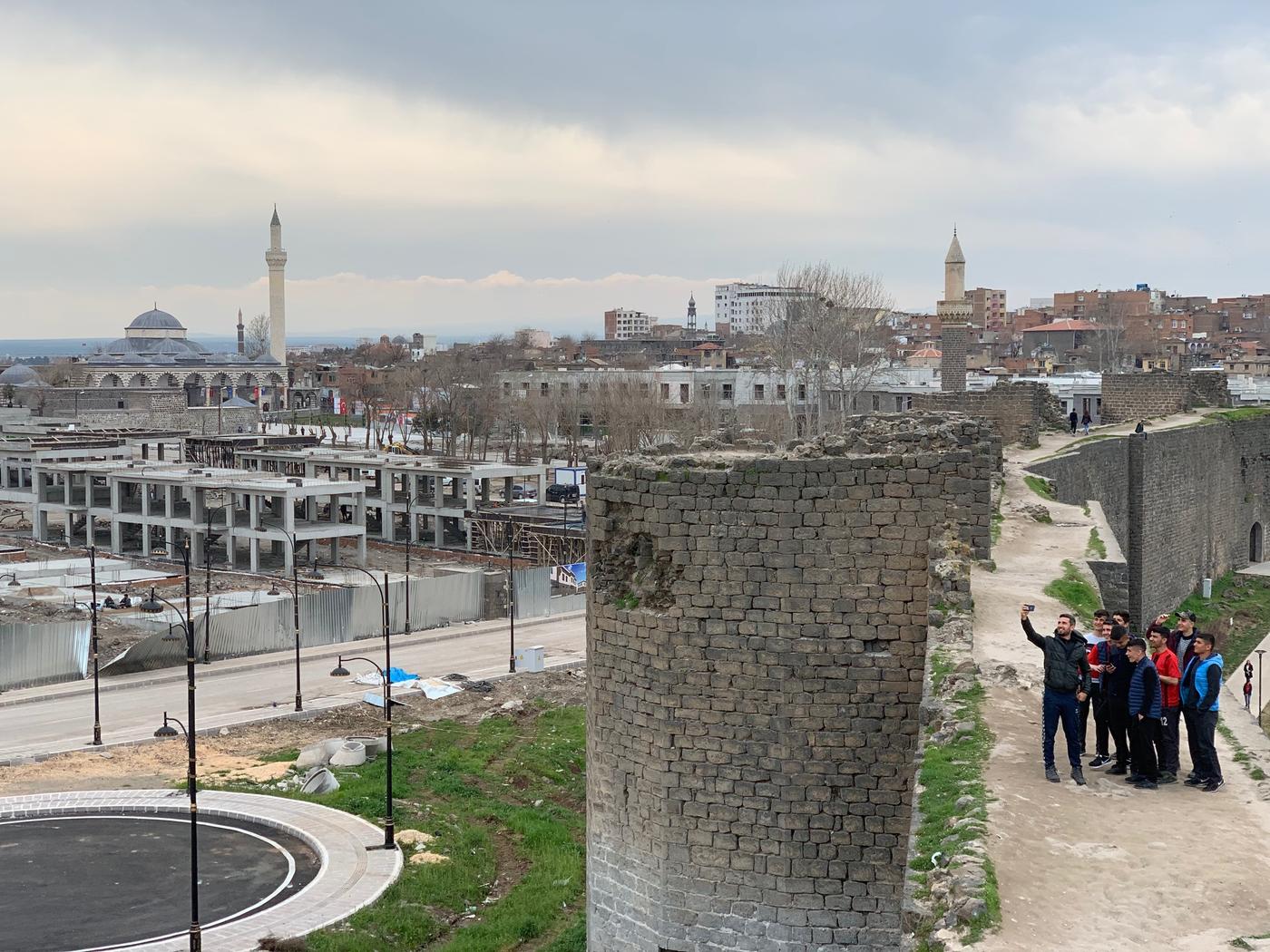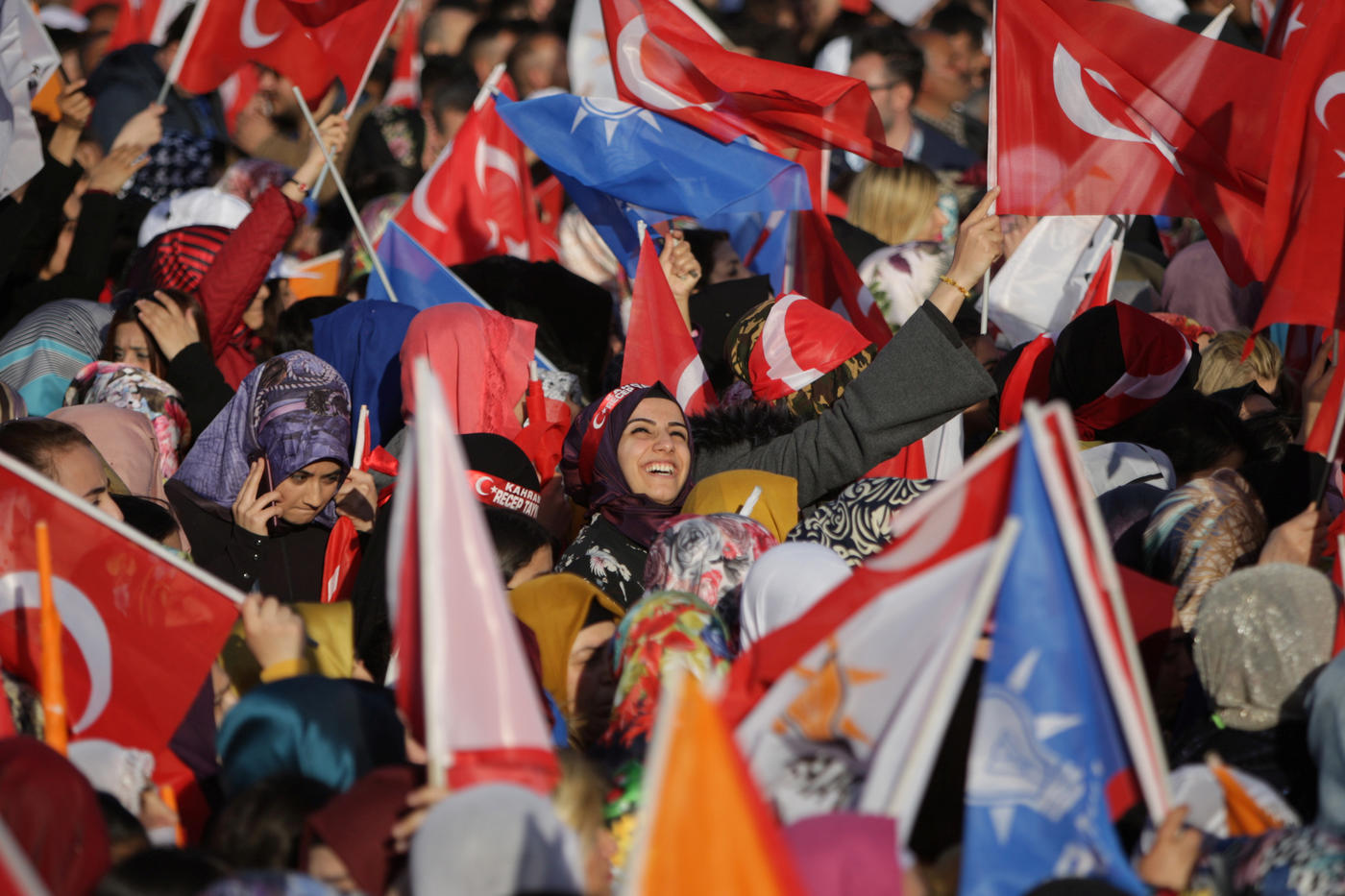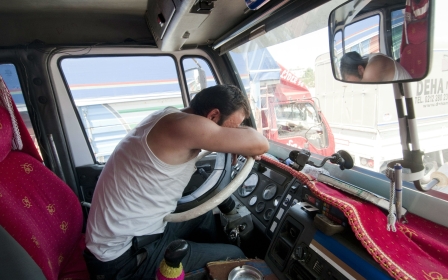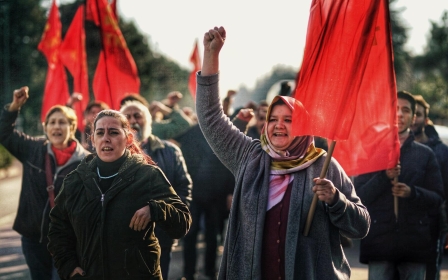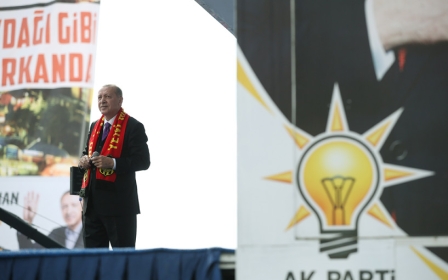Turkish elections: How Kurds are planning to push back against Erdogan's AKP
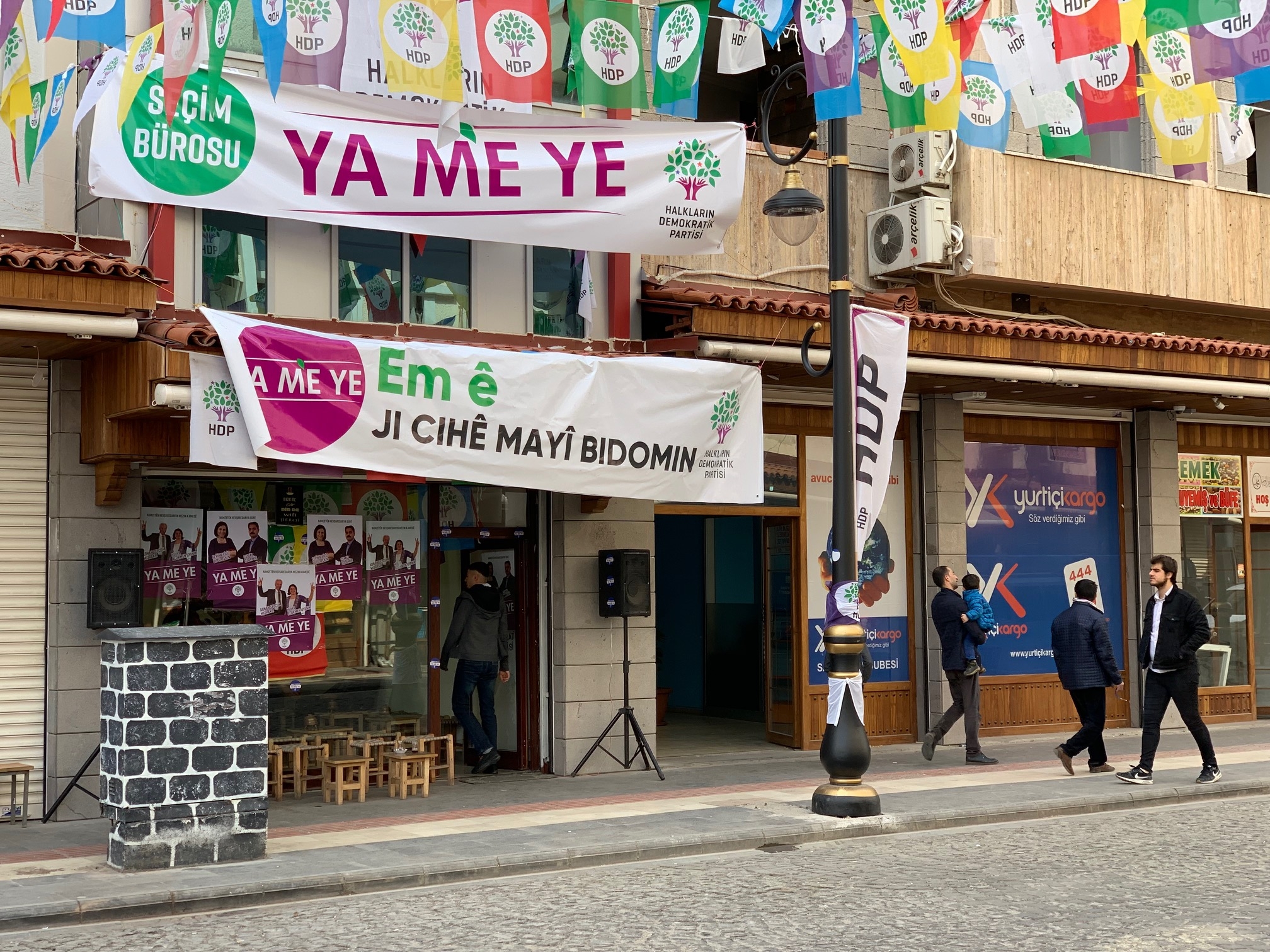
An elderly woman sitting outside the pro-Kurdish People’s Democracy Party (HDP) election office in Diyarbakir’s historic Sur district makes a victory sign with her fingers, as an upbeat Kurdish song that mentions “vengeance and rebellion" is played at full volume.
Police officers down the street look on passively, keeping their distance.
“There is a ruling party [Justice and Development Party, or AKP] election office nearby. They want them to hear the song,” commented a shop owner.
Three years after the urban warfare that took place in Sur between Turkish security forces and Kurdistan Workers’ Party (PKK) militants, destroying numerous ancient buildings and claiming dozens of lives, this southeastern city seems calm.
While the police maintain a presence on some of the main streets, there are no checkpoints.
Kurdish-language posters urging voters to support the HDP are displayed all over the city, the largest with a Kurdish majority in Turkey, alongside Erdogan ads in Turkish talking about the beautiful cities that could be built under his continuing rule.
Despite the HDP's noisy efforts, people in the street don't seem overly excited about Sunday's local elections, which opposition parties have identified as an opportunity to put pressure on Erdogan's AKP, the dominant force in Turkish politics since winning general elections in 2002.
The HDP was founded as an umbrella party of leftist groups and Kurdish politicians in 2014, gaining national prominence in the following year's national elections in which it won 13 percent of the vote and 80 parliamentary seats.
Many municipalities in Kurdish-majority areas in the southeast also fell under the HDP's control after local officials elected as members of the pro-Kurdish Peace and Democracy Party (BDP) switched their allegiance to the party.
‘Ditch warfare’
But following the collapse of the peace process between the Turkish government and the PKK in 2015, Turkish courts imprisoned 12 HDP MPs on terrorism charges, and replaced more than 90 HDP mayors with government-appointed trustees.
Several locals told Middle East Eye that many in Diyarbakir still hold the HDP in disdain because of their support for the PKK's "ditch warfare", a reference to statements by the party's co-leader, Selahattin Demirtas, as street battles erupted in Sur in which he said that the "youth has dug ditches because the state violated the law" and thanked those who had joined the ditch wars.
Demirtas himself was arrested in 2016 and remains in detention on suspicion of links to a terrorist organisation.
But the Turkish government has also been criticised by human rights groups and activists over the ferocity of its campaign in Sur, a UNESCO world heritage site, and by the subsequent demolition of hundreds of homes and displacement of thousands of residents who are still to return.
Three years on from the street fighting in the city, most spoken to by MEE said they still planned to cast their ballots for the HDP on Sunday, despite their frustrations with the party, which polls suggest is on course to pick up about 60 percent of votes.
“Everyone already knows what the election results will be. The HDP, as usual, will win in the region,” said Mehmet Kaya, the chairman of the Diyarbakir Trade and Industry Chamber.
Various polls suggest the HDP is set to win all 94 municipalities in the region that were taken over by the government with court orders in the last three years. But this local election is about more than winning the municipalities in HDP strongholds.
“Our research shows we will win 102 municipalities that we already had in 2014. But this time we will even win more,” said Saruhan Oluc, an HDP deputy who is also the spokesperson for the party.
“But our second aim is to push back against the AKP and MHP [Nationalist Movement Party] dominance in the west [of Turkey],” he added, referring to the electoral pact between the governing party and Devlet Bahceli's far-right nationalists.
Kurdish and leftist voters
In a surprising move in this election, the HDP has not nominated a mayoral candidate in 49 cities out of 81, including in major urban centres such as Istanbul, Ankara, Izmir, Adana and Mersin.
“We have 11-15 percent of general votes in the west. We don’t want to waste them. This is why we will support the best candidate against the AKP and MHP alliance. We want them to lose,” said Oluc.
With the AKP and MHP nominating joint mayoral candidates in major cities, the main secular opposition CHP (Republican People’s Party) has formed its own counter-alliance with the nationalist IYI Party (Good Party).
Neither wants to be associated publicly with the HDP because of its association with the PKK, but their electoral prospects may hinge on their success in mobilising Kurdish and leftist voters.
For example, in the June 2018 general elections in Istanbul, the AKP and MHP gained 51 percent of votes cast. But the opposition vote was divided between CHP and IYI, which together gained a 34.4 percent share, and the HDP which was backed by 12.7 percent of voters.
Similarly, in cities like Antalya, Izmir, Bursa, Sanliurfa, Antalya, Mersin, the HDP's share of the vote could be crucial in challenging what some members of the opposition call a "nationalist alliance".
Analysts say, in part, that the HDP has been pushed to take up this position due to the new presidential system of government that came into force in June 2018.
The system, which concentrates executive power in the presidency, encourages parties to merge and create a two-party system, according to Roj Esir, general manager of the Diyarbakir-based Rawest Research Centre, a data consultancy supporting civil society organisations.
The HDP had to alter its aim to become a national party. The constraints put in place by the system force the HDP to prove itself once again as a regional political power
- Roj Esir, Rawest Research Centre
“The HDP had to alter its aim to become a national party. The constraints put in place by the system force the HDP to prove itself once again as a regional political power. They would like to prove that they still politically represent the Kurds as they seek to undermine the AKP and MHP in the west,” he told MEE.
At first glance, these local elections might not seem to carry much significance, since Erdogan has a mandate until 2023.
But Bahceli, the leader of the MHP for more than two decades and a veteran electoral operator long before falling into alliance with the president, appears to disagree.
Bahceli said last September that losing the three largest cities in Turkey to the opposition could open a way to question the validity of the new presidential system in the public eye.
In the past, he has triggered two early elections that had significant consequences for Turkish politics, and the AKP government currently relies on MHP deputies for its parliamentary majority.
In 2002, when his party was part of a coalition government, he called for early elections that led to the AKP's first ever election victory. Last year, he once again, unexpectedly, declared his willingness to support early elections, catching the opposition unprepared. Erdogan won the presidency with 52.6 percent of votes.
“Actually Bahceli’s statements led the way for the HDP’s decision. They started to think that they have a chance to break the AKP-MHP alliance through this new strategy,” said Sinan Tanrikulu, a Diyarbakir-based lawyer who represented imprisoned PKK leader Abdullah Ocalan at the beginning of the 2000s.
Secret talks
“It is a smart thing to do. Societal opposition, from Islamist parties to Kurdish parties, are either harmed or undermined by this government. So they can create a veiled alliance to counter AKP and MHP.”
HDP officials say the government crackdown against their grassroots support base in the last three years has seen 5,000 people imprisoned, with at least 5,000 more detained and later released. Turkish government officials say the arrests were made on charges of involvement in PKK terrorism.
“The HDP wasn’t left with many instruments. I believe it had secret talks with the CHP to mobilise Kurdish votes to counter the AKP,” said Kaya.
Since the AKP is the second-most popular party among Kurds after the HDP, there is a possibility that some Kurds will vote for AKP-MHP candidates.
But Vahap Coskun, an academic from Dicle University in Diyarbakir, believes that Erdogan’s heated election rhetoric makes it very unlikely that conservative Kurds will cast their votes for the ruling party.
“He said there was no such place as Kurdistan in Turkey and those who are seeking one just should go to Iraqi Kurdistan. They might be conservative. But they are still Kurds,” said Coskun.
Ultimately, Kurdish votes could affect the results of Sunday's vote, but could they lead to a broader political shift in Turkey?
Tanrikulu, Ocalan’s former lawyer, said that the HDP hoped that a poor performance by the AKP would encourage opposition factions within the party, such as the marginalised former prime minister Ahmet Davutoglu, or former president Abdullah Gul.
“They want them to split from the AKP and establish their own parties, therefore undermining its unity,” he said.
But Oluc, the HDP spokesperson, said the party was not interested in political fortune-telling.
“We want to see some political implications, [namely] a self-questioning within government that could create a democratic change,” he said.
Some say the same self-questioning should be done by HDP officials themselves.
A local shop owner, who asked to remain anonymous, claimed that if the city once again fell under the control of the party that PKK representatives would come to his store and ask for a "tax".
The shop owner also said that the government appointed trustee-mayor had done a better job of cleaning the streets, taking care of public transport and bringing order to the daily life of the city.
A local journalist, who also did not want to be quoted by name, with more than 20 years experience in Diyarbakir agreed, citing complaints of corruption raised against HDP officials, and frustration felt by residents about the party's failure to deliver basic services.
Regardless, the Turkish government will need to respond to the HDP if, as polls predict, the party is returned to office in Kurdish-majority towns and cities.
“Would the government keep HDP mayors in place or sack them once again with court orders? That would be interesting to watch. Because keeping them in place would require a new perspective on the government’s side. Maybe a new peace process. We will have to see,” Kaya said.
Middle East Eye propose une couverture et une analyse indépendantes et incomparables du Moyen-Orient, de l’Afrique du Nord et d’autres régions du monde. Pour en savoir plus sur la reprise de ce contenu et les frais qui s’appliquent, veuillez remplir ce formulaire [en anglais]. Pour en savoir plus sur MEE, cliquez ici [en anglais].


